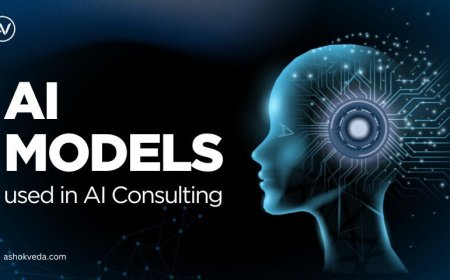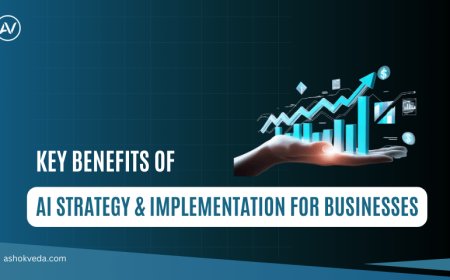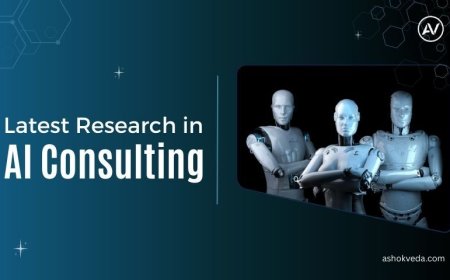Best Open-Source Tools for AI Consulting Professionals
Explore the best open-source tools for AI consulting in 2025, including TensorFlow, PyTorch, and Hugging Face, for scalable, cost-effective AI solutions.
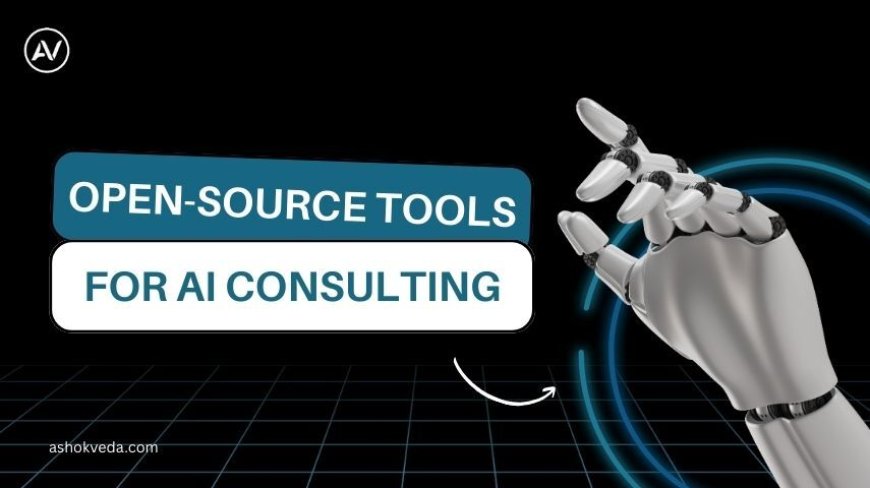
Artificial intelligence (AI) has become a cornerstone of modern business strategies. Organizations across the globe are investing in AI solutions to enhance efficiency, optimize operations, and unlock new revenue streams. As of 2025, over 75% of Fortune 500 companies are expected to implement AI-powered strategies in some capacity, making AI consulting an indispensable service for businesses of all sizes.
One of the critical factors driving the widespread adoption of AI in consulting is the accessibility of open-source tools for AI consulting. These tools not only reduce costs but also provide flexibility, transparency, and a collaborative environment for innovation. Explore the most popular open-source tools used in AI consulting, their applications, benefits, and how they are reshaping the consulting industry.
The Importance of Open-Source Tools in AI Consulting
AI consulting is not just about implementing AI—it’s about providing solutions that are scalable, cost-effective, and tailored to client needs. Open-source tools have emerged as a game-changer in this context for several reasons:
-
Cost Efficiency: Unlike proprietary tools, open-source platforms are free or low-cost, allowing businesses to experiment without heavy financial investment.
-
Transparency: Open-source software provides access to source code, ensuring full transparency in algorithm functionality and decision-making processes.
-
Customization: Consultants can modify the tools to meet specific business requirements, enhancing flexibility.
-
Community Support: Large developer communities contribute to continuous improvement, updates, and troubleshooting.
With these advantages, open-source tools have become a staple for AI consultants aiming to deliver high-value solutions efficiently.
Top Open-Source Tools for AI Consulting
1. TensorFlow
TensorFlow, developed by Google, is one of the most widely used open-source AI frameworks. It provides a comprehensive ecosystem for developing machine learning models, including deep learning architectures.
Key Features:
-
Supports neural networks for image recognition, NLP, and predictive analytics.
-
Provides TensorFlow Lite for mobile and edge deployment.
-
Offers a robust library for training and deploying scalable AI models.
Use in AI Consulting:
AI consultants use TensorFlow to develop solutions ranging from predictive analytics to natural language processing. Its flexibility allows businesses to implement tailored AI strategies for specific operational needs.
2. PyTorch
Developed by Facebook, PyTorch is another leading open-source library for machine learning and deep learning. PyTorch is known for its simplicity, ease of use, and dynamic computation graph capabilities.
Key Features:
-
Supports neural network models with high flexibility.
-
Ideal for rapid prototyping and research-oriented AI projects.
-
Provides extensive libraries for NLP, computer vision, and reinforcement learning.
Use in AI Consulting:
PyTorch enables consultants to build AI models quickly and experiment with advanced algorithms, making it perfect for iterative consulting projects where client feedback needs to be integrated rapidly.
3. Scikit-Learn
Scikit-Learn is a versatile Python library that provides tools for data mining, data analysis, and machine learning. It is widely adopted for supervised and unsupervised learning tasks.
Key Features:
-
Offers algorithms for classification, regression, clustering, and dimensionality reduction.
-
Provides tools for model evaluation, preprocessing, and validation.
-
Highly compatible with other Python libraries like NumPy and Pandas.
Use in AI Consulting:
AI consultants leverage Scikit-Learn for developing predictive models, customer segmentation, and operational forecasting. Its simplicity makes it ideal for rapid deployment and client presentations.
4. Keras
Keras is a high-level neural network API that runs on top of TensorFlow, making deep learning more accessible. It simplifies the process of building, training, and evaluating complex neural networks.
Key Features:
-
User-friendly API for quick model development.
-
Supports convolutional and recurrent neural networks.
-
Compatible with GPUs for faster computations.
Use in AI Consulting:
Keras helps AI consultants create sophisticated AI models without dealing with low-level coding. Its ease of use allows for faster client demonstrations and prototype development.
5. Apache Mahout
Apache Mahout is an open-source library designed for scalable machine learning algorithms. It focuses on clustering, classification, and collaborative filtering.
Key Features:
-
Optimized for large datasets and distributed computing.
-
Integrates seamlessly with Apache Hadoop and Spark.
-
Offers scalable implementations of common machine learning algorithms.
Use in AI Consulting:
Mahout is particularly useful for clients with big data operations. Consultants use it to implement scalable AI solutions for retail analytics, recommendation engines, and predictive modeling.
6. Hugging Face Transformers
Hugging Face provides state-of-the-art models for NLP tasks. Its open-source Transformers library supports a wide range of pre-trained models for text generation, sentiment analysis, and translation.
Key Features:
-
Access to pre-trained NLP models such as BERT, GPT, and RoBERTa.
-
Supports fine-tuning for domain-specific applications.
-
Integrates with TensorFlow and PyTorch.
Use in AI Consulting:
Hugging Face enables consultants to develop natural language solutions quickly, such as automated customer support, content analysis, and sentiment detection.
7. RapidMiner
RapidMiner is an open-source platform that combines data preparation, machine learning, and predictive analytics. It’s designed for ease of use and supports a drag-and-drop interface.
Key Features:
-
Provides visual workflow design for model building.
-
Supports predictive analytics, data mining, and text mining.
-
Compatible with Python and R integrations.
Use in AI Consulting:
Consultants often use RapidMiner to create AI workflows for clients with minimal coding requirements. It’s particularly effective for business analysts who need to interpret data-driven insights quickly.
8. OpenAI Gym
OpenAI Gym is a toolkit for developing and comparing reinforcement learning algorithms. It provides a wide variety of environments to train AI agents.
Key Features:
-
Offers multiple environments for reinforcement learning experiments.
-
Integrates with TensorFlow and PyTorch.
-
Supports custom environment creation.
Use in AI Consulting:
OpenAI Gym allows consultants to experiment with reinforcement learning solutions for logistics optimization, supply chain management, and automated decision-making systems.
Benefits of Using Open-Source Tools in AI Consulting
-
Cost-Effective: Reduces the financial barrier to AI adoption.
-
Flexibility: Consultants can modify tools to meet specific business needs.
-
Transparency: Open-source code ensures explainable AI solutions.
-
Community Support: Large developer communities provide continuous updates and troubleshooting.
-
Rapid Prototyping: Accelerates AI model development and deployment.
-
Scalability: Many open-source tools support distributed computing for big data applications.
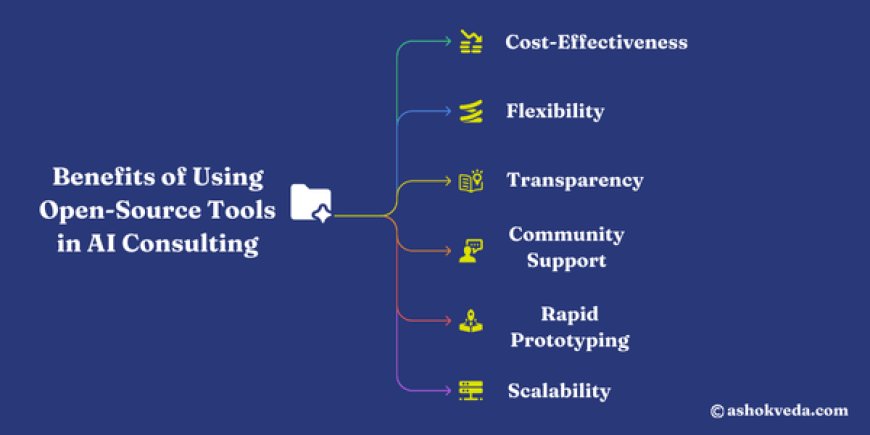
Challenges of Open-Source Tools in AI Consulting
While open-source tools offer tremendous advantages, they also come with challenges:
-
Technical Expertise: Consultants need advanced knowledge to implement and customize these tools effectively.
-
Integration Issues: Open-source tools may require additional effort to integrate with legacy systems.
-
Security Concerns: Open-source tools may have vulnerabilities that require constant monitoring.
-
Limited Support: Unlike proprietary software, official support may be limited, relying heavily on community forums.
Popular Applications in AI Consulting
-
Predictive Analytics: Forecasting sales, customer churn, and market trends.
-
Natural Language Processing: Automating content generation, sentiment analysis, and chatbots.
-
Computer Vision: Object detection, facial recognition, and quality control in manufacturing.
-
Reinforcement Learning: Optimizing logistics, resource allocation, and supply chain efficiency.
-
Recommendation Systems: Personalized marketing, product recommendations, and content delivery.
Open-source tools are central to implementing these solutions effectively, offering a cost-efficient and flexible approach for businesses.
Future of Open-Source AI Tools in Consulting
The demand for open-source tools for AI consulting is expected to surge further. Businesses will increasingly seek customizable and transparent solutions that provide measurable ROI. Open-source platforms will continue to evolve, offering advanced capabilities like automated machine learning (AutoML), explainable AI, and edge computing integrations. For AI consultants, mastering these tools will be crucial to staying competitive in a rapidly evolving industry.
Open-source tools have revolutionized the industry of AI consulting by making sophisticated AI capabilities accessible to businesses of all sizes. From TensorFlow and PyTorch to Hugging Face and RapidMiner, these tools empower AI consultants to deliver innovative, cost-effective, and scalable solutions. While challenges such as technical complexity and integration exist, the advantages far outweigh the limitations. As businesses continue to embrace AI as a strategic asset, leveraging open-source tools will be central to delivering value-driven consulting services in 2025 and beyond.

























